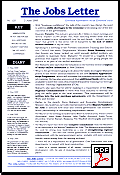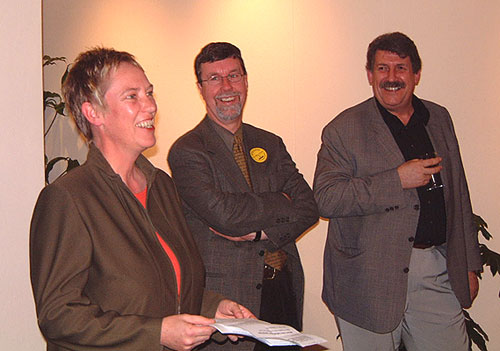



|
 |

|
| No.155 | 2 November 2001 | Essential Information on an Essential Issue |
of key events over the last few weeks. ALLIANCE PLAN FOR YOUNG JOBLESS TRACKING SCHOOL-LEAVERS EMPLOYMENT CATALYST FUND MEDICAL DEBTS LOSING NZ DOCTORS BRITISH OVERHAUL OF STUDENT LOANS LABOUR MARKET INFO ONLINE WINZ REGIONAL PROJECTS ANNOUNCED SOCIAL ENTREPRENEURSHIP  LAST Letter
LAST Letter
NEXT Letter   Download this issue as a PDF file
Index to Features
14 October 2001A four-day workweek may help to save jobs at German airline Lufthansa. Management is working with unions and employee representatives on ways to stem the company's financial losses without laying off staff. Chief executive Juergen Weber says measures being discussed include flexible working hours and a shorter working week. 15 October 2001The UN predicts global economic growth will be 1.4% this year. With the world population growing at 2.5%, analysts say that global economic growth of less than the birth rate indicates recession. The number of US workers filing for unemployment benefits in September is the highest in ten years. 16 October 2001Minister of Social Services and Employment Steve Maharey says that the government will not adopt a time limits approach to welfare benefits. Maharey says the scheme used in the US has resulted in deepening poverty among the poorest families with children. Act Party Social Services spokesperson Muriel Newman says that she has evidence that shows that the move to time limit welfare benefits in the US encourages beneficiaries to re-integrate into the workforce and escape the poverty trap. Jobs will be cut at the Nelson Marlborough Institute of Technology as it drops programmes that have declining enrollments. Chief executive John Cretney says that because many staff are part-time, more than 35 people will be affected. At their biennial conference, Council of Trade Unions delegates back a bid to resist any workplace culture that promotes work to the exclusion of family and community values. President Ross Wilson says the CTU is developing a campaign that will include bargaining strategies for flexible working hours, family leave and job-sharing. German technology company Siemens says it will close ten plants and cut 7,000 jobs over the next year, about half of them in Germany. Siemens has already dropped 10,000 staff this year. 17 October 2001There has been a significant rise in the number of inquiries from foreign students wanting to attend NZ tertiary education institutions. It appears safety is a factor in re-directing students from what has been their most favoured destination, the US. While it is too early to know whether the inquiries will turn into enrollments, international political events, together with an increased marketing campaign by some NZ institutions, indicate large increases in foreign student numbers next year. 18 October 2001NZ is rated as the tenth most competitive nation in the world according to the Global Competitiveness Report. The Harvard University survey rates the expected level of economic growth by surveying economic data and interviewing local executives on non-statistical issues. Finland rated first, the US second, and Australia sixth. 19 October 2001As Ansett airline call centres close, about 500 employees in Sydney and Brisbane lose their jobs. 20 October 2001Former Winz boss Christine Rankin says in her Weekend Herald column says that most beneficiaries want to work. But Rankin says there are three major obstacles to many people getting work: lack of life skills (cooking, cleaning, budgeting, child rearing), illiteracy, and drug and alcohol problems. She advocates that benefits should be declined or partly declined to provide incentives for people to participate in programmes that would help them overcome their personal barriers to employment. 22 October 2001Labour Day 23 October 2001As the Singapore economy shrinks, unemployment is expected to rise from 2.6% at mid-year to 4% by the end of the year. Swissair cuts 9,000 jobs as it is taken over by its own subsidiary Crossair. Swiss president Moritz Leuenberger says that if the bailout package does not work, it will be the end for the Swiss airline. Will Baily, a former chief executive of ANZ Banking Group in Australia says there should be a national debate on the re-creation of a state-own bank. Baily says 20% of Australians, including many small business owners and farmers, have been unable to benefit from private banking. He says a state-owned bank could operate out of the Australia Post network. The US communications industry continues to lose jobs. SBC Communications will cut "thousands of jobs"; AT&T continues to cut staff; Bell South cuts 3,000 and Sprint cuts 6,000 jobs. Other tech industry job losses include 3,000 at Unisys in New York and 2,300 from the scrapping of international long distance telephone project Concert. 25 October 2001Auckland-based boogie and body board manufacturer Broady International shifts its plant to Indonesia with the local loss of about 20 jobs. Director Brian Thorrington says there is nothing the government could have done to keep them in NZ. Thorrington: "Basically it takes cheap labour and we don't have that here." The International Labour Organisation says the world tourism industry could lose more than nine million jobs as a result of the September 11 attacks. 26 October 2001Italian national airlines Alitalia says it will lay off 5,200 staff. 28 October 2001In a bid to keep their own citizens in work, Malaysian authorities cut the length of stay for foreign workers from six to three years. This will result in about 300,000 people will being deported within the next three months. In neighbouring Singapore, workers say it is nearly impossible to find work if they are not Singaporean. 29 October 2001Canterbury University distributes invitations to staff to apply for volunteer redundancy. About 90 lecturing and administration jobs are expected to go.
 LAST Diary
LAST Diary
NEXT Diary 

"The in-born creativity of all people is no mean or accidental thing. Neglect it, and it becomes an inner source of poison. On the other hand, nothing can stop the flowering of a society that manages to give free rein to the creativity of all its people..." — Fritz Schumacher, author of Good Work (1979)
|
ALLIANCE PLAN FOR YOUNG JOBLESS Gyon Espiner of the Sunday Star Times reports that the Alliance will officially launch its policy package at its annual conference next week. He says that the programme will give jobless teenagers an alternative to the dole ... although they will not be cut off from income support for not participating. Anderton: "I think the scheme would have a significant effect on unemployment because we know that the highest levels of unemployment tend to be amongst young people. If you have no skills at all your chances of getting employment are getting less and less so we have to intervene to make sure kids don't get into that trap ..." Source — Sunday Star-Times 28 October 2001 "Anderton's hopes in new policies" by Guyon EspinerSource — Household Labour Force Survey June 2001 (see our Statistics That Matter www.jobsletter.org.nz/stat/stathome.htm); Speech by Steve Maharey 24 October 2001 "Finding out where our kids go once they leave school"; ; The Dominion 25 October 2001 "Unemployment "black hole" for school leavers"
MAYORS TASKFORCE WELCOMES POLICY MOVESMoore: "I applaud Jim Anderton's compassion and commitment in this area, and we've always had terrific support from the Deputy Prime Minister. It is a really good sign when senior politicians pick up initiatives like this and put it at the top of their agenda. "The Alliance policy will be an excellent step forward … and I think it is a challenge to other political parties to take even bolder steps. I'd like to see the country pick up the goals of the Mayors Taskforce that all young people under 25 years have the opportunity to be in work or training…" Source — interview with The Jobs Letter editor vivian Hutchinson 1 November 2001ANOTHER DESTINATIONS AND TRACKING PILOTA further pilot programme was launched last week in Porirua by Associate Education Minister Steve Maharey. The Porirua programme will interview 900 senior students from four schools about their plans for next year, and the Career Services freephone (known as CareerPoint) will follow up with the students next year to see what they actually did, and provide further careers advice if needed. Judith Backhouse, the Project Manager for the programme, has based it on a UK model called the Activity Survey which is carried out annually amongst British school-leavers. Backhouse had first-hand experience with this model as a Careers Advisor in the UK, and when approached by the Mayors Taskforce saw the opportunity to develop something similar in NZ. Steve Maharey is considering a nationwide expansion of the programme, once evaluation of the pilot programmes in Christchurch and Porirua are completed. Source — "Ensuring young people tap into education and employment opportunities" speech by Steve Maharey Associate Minister of Education 24 October 2001 at launch of Porirua Destinations and Tracking project, Pataka Museum of Arts and Culture, Porirua

EMPLOYMENT CATALYST PROJECTSThe Employment Catalyst fund intends to encourage innovative initiatives for employment creation in New Zealand, especially those with a focus on youth employment. The funding will be targeted at the regions (outside of Auckland, Wellington, and Christchurch) and will be provided on a 1:1 matching basis, depending on the amount of local funding already raised for the initiatives. Because of their similar aims, the Employment Catalyst in 2001-2002 will be supporting youth employment projects emerging from the Mayors Taskforce for Jobs. Ten Mayors involved in the Taskforce have indicated they are working on developing projects. Initiatives in the Far North, Canterbury and Taranaki are already underway. For more information, contact Jan Francis, Mayors Taskforce for Jobs phone 03-384-8212 email j.francis@clear.net.nz MEDICAL DEBT LOSING NZ DOCTORSMedical Students Association president Richard Pole says that the "staggering" levels of debt are set to play a big part in health workforce shortages in coming years. He calls for tax incentives and student loan discounts for "loyal" doctors who stay in NZ after graduating. Medical Association chairman John Adams agrees: "It makes no sense economically not to
help these students, because thousands of dollars of taxpayers' money has already gone into
their education … We need practical ways of reducing the burden and encouraging doctors to stay
here and work."
But The Dominion last week reported that such a plan would cost up to a billion dollars. A spokesperson for Annette King says the Minister is looking into loyalty payments, or a bond system, but a government contribution of a billion dollars was "not realistic". Meanwhile, Alliance MP Liz Gordon says as it would be politically difficult to subsidize debt repayments for doctors, nurses and dentists when other professions might argue they were equally deserving. Although she personally supports schemes which bond young professionals to NZ … she believes there is little political support for such a programme in the electorate. The Alliance is to focus on extending the student allowance scheme rather than pursuing loyalty payments. Sources — New Zealand Wellbeing, Intentions, Debt and Experience Survey (WIDE), NZ Medical Journal 26 October 2001; The Dominion 26 October 2001 "Loan debt drives doctors overseas" by Marianne Betts; The Daily News 26 October 2001 "Report: Debt driving out graduates" by NZPA; The Dominion 27 October 2001 "cash Plan proposed to keep doctors in NZ" by Jonathon Milne; New Zealand Herald 27 October 2001 "Young doctors sick of debt" by Rosaleen Macbrayne; newsroom.co.nz 26 October 2001 "Median Medical Student Debt Now $70,000.BRITAIN TO OVERHAUL STUDENT LOANSThe reforms will probably see the end (or the substantial reduction) of student fees. The British government is saying that this year 50% of students will pay no fees at all. Maintenance grants (student allowances) will also be brought back in for lower-income students, and possibly also on a universal basis. While the details of the new British scheme have yet to be worked out, the Guardian reports that future graduates may be required to pay extra income tax for 20-25 years after leaving university. They would be required to pay this graduate tax regardless of whether or not they take out a student allowance, but it would be "a pebble, rather than a millstone". Source — Guardian Weekly 11 October 2001 "Government agrees to restore student grants" by Will WoodwardLABOUR MARKET INFORMATION ONLINEhttp://www.lmpg.govt.nz/Labour-Market-Reports.htm WINZ REGIONAL PROJECTS ANNOUNCEDThe programmes include:
Source — Press Release Steve Maharey Minister of Social Services and Employment 18 October 2001 "Regional job fund projects announced"SOCIAL ENTREPRENEURSHIP CONFERENCE The Social Entrepreneurship Conference 2001 will be held in the Wellington Town
Hall 22-23 November. It is being hosted by the Community Employment Group in co-operation
with Commact Aotearoa, the Commonwealth economic development association. Key speakers
will include Minister of Social Services and Employment Steve Maharey, and leaders from
community-based social, economic and environmental initiatives from throughout New Zealand.
Overseas speakers will include Jane Sloan and Vern Hughes (from the Australian Social
Entrepreneurs Network) and Peter Botsman (University of Queensland). The conference facilitator will
be Vivian Hutchinson (editor of The Jobs
Letter). The Social Entrepreneurship Conference 2001 will be held in the Wellington Town
Hall 22-23 November. It is being hosted by the Community Employment Group in co-operation
with Commact Aotearoa, the Commonwealth economic development association. Key speakers
will include Minister of Social Services and Employment Steve Maharey, and leaders from
community-based social, economic and environmental initiatives from throughout New Zealand.
Overseas speakers will include Jane Sloan and Vern Hughes (from the Australian Social
Entrepreneurs Network) and Peter Botsman (University of Queensland). The conference facilitator will
be Vivian Hutchinson (editor of The Jobs
Letter).
Conference fee is $200, and places will be restricted to 200 people (150 from the
community sector and 50 from government). For more information contact Trish Hepburn or Andrea
Lynch at CEG phone 04-914-4900 email andrea.lynch@ceg.dol.govt.nz
VOICE: ON SOCIAL ENTREPRENEURSHIP "For me the word "entrepreneur" means someone with drive and ideas, a person
with the potential and passion to create something new where there was nothing before —
someone with the knack for making a lot out of very little. Social Entrepreneurs are doing just that;
creating a better New Zealand by combining inventive ideas with energy and resources. Very
often, fresh approaches to development and community work can be traced back to inspired
self-starters, who understand instinctively the who, why, what and how of community work. They
sweat blood to make an idea happen. You can't buy that sort of enthusiasm — you can only try
and support it when you find it." "For me the word "entrepreneur" means someone with drive and ideas, a person
with the potential and passion to create something new where there was nothing before —
someone with the knack for making a lot out of very little. Social Entrepreneurs are doing just that;
creating a better New Zealand by combining inventive ideas with energy and resources. Very
often, fresh approaches to development and community work can be traced back to inspired
self-starters, who understand instinctively the who, why, what and how of community work. They
sweat blood to make an idea happen. You can't buy that sort of enthusiasm — you can only try
and support it when you find it."
— Stephen Tindall, from the Tindall Foundation Annual Report 2001
|